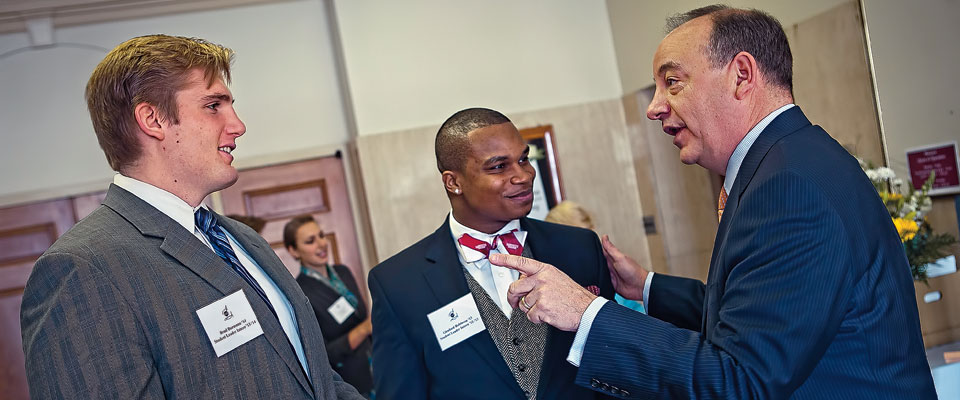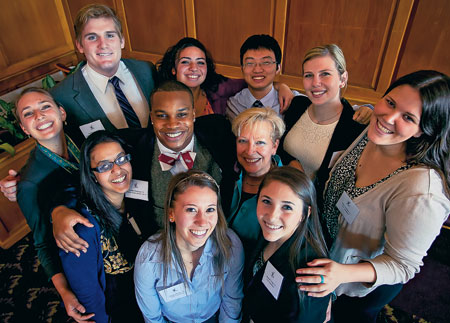Mar 20, 2013
All the Right Choices
Students have the opportunity to develop and exercise their leadership skills not only in their academic endeavors but also through more than 100 student…

Brad Bormann ’14 (left) and Glen Robinson ’13 talk with 2013 keynote speaker Robert E. Sell ’84, consulting chief executive of communications, media, and technology for Accenture and a member of the Lafayette Board of Trustees.
by Kate Helm | photography by Chuck Zovko
Leaders aren’t born; they’re made, said Hall of Fame football coach Vince Lombardi. He recognized that the characteristics of leadership are cultivated and honed and that the best leaders never stop learning how to lead.
As president and CEO of Goodrich Capital in New York City, Bob Albus ’68 knows the value of true leadership. Someone once questioned him about whether he thought leadership was an innate quality or could be taught. He believes everyone possesses the ability to lead, but that the ability must be cultivated, which is exactly the mission of Lafayette Leadership Institute.
“I believe that leadership qualities enhance someone’s ability to grow in their respective fields,” he says. “Leaders set the pace, have vision, and can withstand the normal issues that come up in life.”

Glen Robinson ’13 and Pam Brewer in center surrounded by student members of the committee (clockwise from center front) Brooke Kohler ’13, Shehtaz Huq ’14, Tatiana Logan ’13, Brad Bormann ’14, Rachel Peña ’14, Sicheng “S.C.” Wang ’14, Sarah Frohnapfel ’13, Jaclyn Fonteyne ’13, and Rachael Trupp ’14.
Leading isn’t simply an act of holding an officer position in a group or business. Being a leader is an intrinsic characteristic, and the best ones never stop learning how to lead.
Every February for nearly two decades, students, faculty, staff, and alumni converge for LLI, a one-day conference held on campus. Student leaders have the opportunity to learn from the best and brightest in their fields. Their successes. Their failures. And how to keep improving.
Because nurturing young leaders is so important to Pam Brewer, associate dean of students and director of student life programs, she created LLI in 1995 and continues to oversee it. Developing leadership skills is such an essential part of the college experience that, she says, not providing the opportunity for students to build those characteristics is failure.
Staging LLI is a valuable exercise in leadership itself. Brewer turns the reins over each year to two carefully selected student interns and a committee (see “By Their Hands”) who, with her guidance, run the show.
Glen Robinson ’13, of Brooklyn, N.Y., and Brad Bormann ’14, of Flemington, N.J., took the point for this year’s conference themed “Pards in Progress: Leadership Under Construction.” It is a fitting theme for the approximately 200 first-year and sophomore students who attended. Invitations to LLI alternate each year between first-year and sophomore “emerging” leaders and junior and senior “experienced” leaders.
Robinson, who was junior intern for last year’s LLI, not only spearheaded the organization of this year’s event, but also served as a mentor to Bormann, who will assume the lead role in his senior year while mentoring the junior intern. Unlike Bormann, who attended LLI as a first-year student, Robinson has only been involved in a managerial role, giving him a unique “top-down” perspective on planning the conference.
“It forced me to think about the underlying mechanisms of leadership and how best to tailor the conference to suit the students’ needs,” says Robinson, a neuroscience major who has presented research he conducted with Elaine Reynolds, associate professor of biology, at the 2012 Society for Neuroscience Conference held in New Orleans as well as research conducted at Case Western Reserve University School of Medicine at the 2012 Annual Biomedical Research Conference for Minority Students held in San Jose.
The LLI internship is right up Robinson’s alley. As head supervisor of Kirby Sports Center’s facility department, he oversees a staff of 50 entry-level and supervisor-level employees, including student workers and part-time staff. He collaborates with professional staff to provide educational opportunities for employees related to their positions and facilitates biweekly staff meetings as well as other logistics to keep the center running smoothly.
Bormann, an outside linebacker on the football team who was recently named to the FCS Athletic Directors Association Academic All Star Team, is a true team player, too. In his fi rst year as an LLI intern, he realized the importance of collaborative leadership. “Impactful leadership endeavors cannot be accomplished by one person alone, and having the active and engaged assistance of capable people has proven absolutely instrumental in the success of LLI,” he says.
The biology major has segued EXCEL Scholars research he began with Manuel Ospina-Giraldo, assistant professor of biology, into independent study research and is a supplemental instructor for the General Biology class. He also is a peer mentor for first-year student-athletes, Kaleidoscope student leader, and volunteer for the Landis Community Outreach Center’s Adopt-a-Grandparent program at the Easton Area Senior Center, which has taught him that even “though a leader tries to do something for the good of other people, often it is the leader who benefi ts and learns the most.”
More than 3,000 Lafayette students have participated in the institute over the years. Many have gone on to become influential leaders in their careers and communities. Comments from a few members of this group help reveal the special character of not only LLI but also the academically focused, residential setting that nurtures and enhances the seeds of leadership.
Learning to lead at the undergraduate level is only the first step in a lifelong process of developing as a leader. Meghan Ramsey ’04, of Menlo Park, Calif., knows that leadership is about confidence. A pulmonary and critical care fellow at Stanford Hospital and Clinics, she was a senior intern for LLI. As a physician, she is an expert among experts—physicians, nurses, therapists, social workers, pharmacists—all of whom must work together to provide patients with the best possible care. Her work literally can mean life or death.
“A leader is not a position someone is offered,” says Ramsey, a neuroscience graduate and Barry M. Goldwater Scholar who earned her M.D. from Stanford Medical School. “Leadership requires a skill set, which is developed with experience. Whatever path you take after graduation, success requires you to have the confidence to make decisions, both large and small. Undergraduate leadership opportunities like LLI foster this confidence.”
It’s cliché, but it’s true: “There is no ‘I’ in leader,” Ramsey continues. “A leader provides the path and environment that members of a team need to succeed as individuals and as a group, striving toward a common goal.” Nowhere was that more evident than when she spent two months treating people with HIV and tuberculosis in a rural community in Tugela Ferry, South Africa, through the Johnson & Johnson Global Health Scholars Program. She overcame the challenges of being a foreign doctor working in a different culture and environment to teach the local medical community and care for patients.
“Applying the skills I learned about multidisciplinary collaboration through LLI has allowed me to be a successful physician,” she says. Captain of the women’s soccer team in her senior year, Ramsey was a two-time ECAC Division I Scholar Athlete of the Year. A chemistry lab teaching assistant, she also published her EXCEL Scholar research in the Journal of the American Chemical Society and the Journal of Physical Chemistry B.
 Makeup artist Jenna Menard ’03, of New York City, mentored Ramsey when she was senior intern for LLI. Like Ramsey, Menard believes the best leaders have the ability to pull a team together to achieve results. She also knows leadership is a risk.
Makeup artist Jenna Menard ’03, of New York City, mentored Ramsey when she was senior intern for LLI. Like Ramsey, Menard believes the best leaders have the ability to pull a team together to achieve results. She also knows leadership is a risk.
If she wasn’t willing to take risks, Menard, a psychology graduate, may never have had the confidence to pursue a career she is passionate about. That career has led to opportunities like being named Clinique’s first global color artist in 2011. Last spring, Menard collaborated with Clinique to create the limited edition lipstick shade “Runway Coral.” The runway, in fact, is where many of Menard’s looks come to life. During Fashion Week, for example, she works with a team of artists to create the makeup looks for the runway models.
“Undergraduate leadership opportunities like LLI foster confidence.” — MEGHAN RAMSEY ’04
“At Lafayette, I participated in leadership positions because I loved being involved,” says Menard, who was a member of Student Government and an orientation leader and co-chair. “I was passionate about the various roles I took on; it is important to participate in roles you are committed to rather than just filling a spot. I took the same approach to finding a career.”
Developing her leadership skills as an undergraduate and through her career has also given Menard the confidence to affect change in her community. She has organized two charity runs to honor a high school classmate killed in military action and an uncle who passed away from colon cancer.
James Kohl ’97, of Bow, N.H., knows about risk too. Without a template to follow as lead intern for the first LLI in 1996 and its follow-up in 1997, Kohl envisioned a process, put it in motion, and thereby set the tempo for all the conferences that followed.
An experienced leader on campus, Kohl had been a resident adviser and Farinon College Center night manager, and held various positions in Delta Upsilon fraternity. However, his work with LLI under Brewer’s tutelage taught him some of his first lessons about decision-making, facilitating group discussions, maximizing the skills and talents of others, managing details while keeping an eye on the big picture, and how to handle unexpected situations.
Now associate dean of student affairs at University of Massachusetts-Lowell, Kohl is tasked with being the kind of mentor Brewer was to him by helping nearly 15,000 undergraduate and graduate students find personal and academic success. Launching LLI from the ground up is not unlike what he is facing as a member of UMass Lowell’s Climate Action Plan Committee, charged with developing and implementing a strategic plan for the university to be carbon neutral by 2050.
Kohl is leading a subgroup to educate students about climate change and their role in addressing it, and facilitating ways in which they can reduce their carbon footprint.
The idea of reducing climate change is an overwhelmingly big one that can paralyze students who don’t know where to begin. Kohl, a psychology graduate who earned his Ph.D. at University of Maryland– College Park, is doing what he did with LLI: helping his committee break the goals into smaller, manageable steps. The group is ready to roll out its Personal Climate Action Challenge for all UMass Lowell students next semester, which details specific carbon-reducing actions that students can take immediately.
Working in higher education, Kohl knows how crucial it is for students to explore their leadership talents as undergraduates. College, he says, is not the time to stockpile skills to use in the vague future, but rather a time for active engagement in the world. Leadership, he cautions, doesn’t mean dictatorship.
“Successful leaders guide others in the achievement of a common goal, and if they fail, reflect on and learn from those failures to succeed in the future,” he says. “They must understand the challenge immediately before them and have the foresight to see and prepare for challenges that lie ahead. They also need to build relationships based on trust, credibility, mutual respect, teamwork, and an ethic of caring that results in others choosing to follow even when they don’t have to.”
That is the heart of what LLI does each year. By connecting student leaders who are still finding their way with alumni, faculty, and staff who have walked that path before them, LLI builds the skills and provides the safety net students need to step out and achieve big things.
Bormann summarizes it best: “Leadership is a risk. Lafayette is a wonderful place for emerging leaders because, unlike nearly any other organization a person works with, the College provides dedicated, experienced, and capable professionals as a support network for students. If you fail, there are people to catch you and push you to try again until you find success.”
Students have the opportunity to develop and exercise their leadership skills not only in their academic endeavors but also through more than 100 student…
Lafayette Leadership Institute has educated emerging undergraduate leaders for 17 years. Each February, the one-day conference features an alumni keynote…
DANIEL BAHNER, assistant director, residence life BRAD BORMANN ’14, intern leader PAM BREWER, chair ALAN CHILDS, professor of psychology JACLYN FONTEYNE…